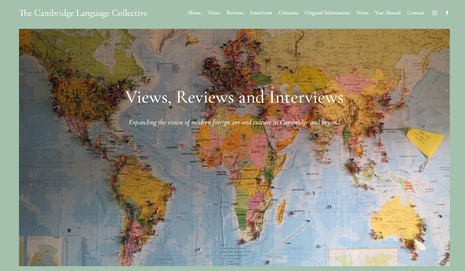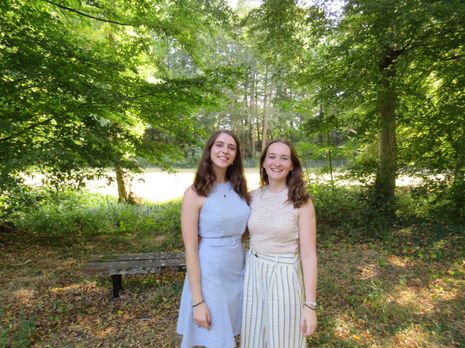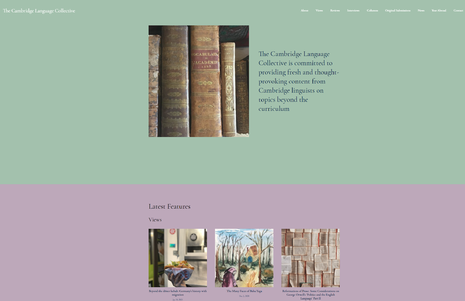Where cultural minds converge: The story behind the Cambridge Language Collective
Yan-Yi Lee talks to MML students Liv Bonsall and Hannah Sherry about the interesting origins of the Cambridge Language Collective.

The coronavirus pandemic has had many of us confined behind walls, both physically and mentally. But two fourth-year Modern and Medieval Languages (MML) students at Fitzwilliam College, Liv Bonsall and Hannah Sherry, were not interested in letting these barriers hinder mind-to-mind connections. Most certainly not during a lockdown!
It was last March, during the heat of Covid-19. Liv Bonsall had just flown across the pond from Cuba back to the UK, and was reminiscing about her conversation with Haitian author Yanick Lahens during a Cambridge supervision. She vividly recalls the sparks of inspiration that day:
“It’ll be really cool to find a space to talk about these people we’ve been able to talk to ... all these foreign authors and our interviews with them.”
‘It’ll be really cool to find a space to talk about these people we’ve been able to talk to ... all these foreign authors and our interviews with them.’
This, along with the confinements of lockdown, was the genesis of what later came to be the Cambridge Language Collective. From an analysis of War and Peace screen adaptations to deep talks on British Sign Language, the page features a collection of student writing focusing on language and cultural developments across borders.

However, little did Bonsall know that the page was going to grow incredibly fast. Since the launch of the page on October 2nd, 2020 until mid-January 2021, there have been more than 80 articles published and a whopping 15, 000 page views from at least 5000 individual visitors. The page has also enjoyed readership in 65 countries.
With the rapid growth of the project, Bonsall soon found herself inviting her close friend Hannah Sherry to run the page with her. Throughout the summer of 2020 they interviewed around 50 applicants from various humanities subjects – classics, English, and Asian and Middle Eastern studies (AMES) – all of whom expressed keen interest in contributing to the page.
“Since the launch of the page...there have been more than 80 articles published and a whopping 15, 000 page views from at least 5000 individual visitors.”
‘Initially, I thought it was going to be MML-based and I didn’t think that it would become a society,’ Bonsall reflected, pleasantly surprised.
The Cambridge Language Collective began with ‘Views, Reviews, and Interviews’. As the popularity of the page grew, the innovative pair took the initiative to create more sections for an all-encompassing website – one that Bonsall & Sherry’s efficient team of 24 have worked creatively to maintain.
‘So there were views, reviews, and interviews – the main three that we started with. And then we expanded it to have a news section because we thought it’s very easy to be trapped in a Cambridge bubble and often we just don’t have a clue what’s happening outside… there’s a column for regular writers and there is original submissions as well so people can submit things in a foreign language or a short story that has to do with foreign culture.’ Sherry explained.

In some dimensions, the Cambridge Language Collective does share similar goals with Polyglossia Magazine, the official printed magazine of Cambridge University Languages and Culture Society (CULCS). However, the two parties have worked strategically to complement each other and to avoid any conflicts of interest:
‘Because we are focused on similar areas of interest, we thought it’d be a good idea to reach out to them and work with them on things, because then we can reach more people that way, and increase each other’s followers and promote each other’, Sherry analysed.
And the project does not stop at the communication of the written word. There are plans for film screenings, poetry reading, and musical evenings for when the university reopens. For the time being, year-abroad panels are on the agenda:
‘The year abroad panel will focus on the alumni rather than the people who are still at Cambridge. So we’re hoping to ask people from all the colleges, who have done their year abroad from 1 to 25 years ago … just to see the difference and to see if the year abroad has had an impact on their career.’ Bonsall added.
The Cambridge Language Collective has also made an effort to engage with writers across different age groups beyond our university town, and the outreach comes with a thoughtful educational purpose:
‘In terms of expanding beyond Cambridge, we have an essay competition running this term – a junior section for students in years 9 to 11, and a senior section, for Sixth Form.’
Bonsall and Sherry reiterate that the Cambridge Language Collective is meant for all language and culture enthusiasts, welcoming students from within and beyond MML and humanities subjects. Interested readers may follow the Cambridge Language Collective on all major social media sites: Facebook, Twitter, and Instagram. Writers who wish to contribute are warmly welcome to pitch an idea to the committee.
 News / Cambridge academics stand out in King’s 2026 Honours List2 January 2026
News / Cambridge academics stand out in King’s 2026 Honours List2 January 2026 Interviews / You don’t need to peak at Cambridge, says Robin Harding31 December 2025
Interviews / You don’t need to peak at Cambridge, says Robin Harding31 December 2025 News / AstraZeneca sues for £32 million over faulty construction at Cambridge Campus31 December 2025
News / AstraZeneca sues for £32 million over faulty construction at Cambridge Campus31 December 2025 News / News in Brief: Maypole mentions, makeovers, and moving exhibits4 January 2026
News / News in Brief: Maypole mentions, makeovers, and moving exhibits4 January 2026 Features / “It’s a momentary expression of rage”: reforming democracy from Cambridge4 January 2026
Features / “It’s a momentary expression of rage”: reforming democracy from Cambridge4 January 2026










